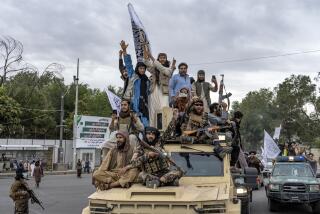Afghan Rebel Regime Seeks Recognition
- Share via
ISLAMABAD, Pakistan — Afghan guerrilla leaders ended a two-week assembly here Friday with a call for the United Nations and “all the nations of the Free World” to recognize their government in exile as the government of Afghanistan.
Their new president, Sibghatullah Mojaddidi, said the exile government “represents all the Afghan people,” and he pledged that it will move to new headquarters in Afghanistan “in one month, God willing.”
Western diplomats are skeptical about the extent of Afghan support for the new government, which was elected Thursday from among the seven leaders of the seven-party rebel alliance based in Pakistan.
Many Afghans have said that the largely fundamentalist alliance does not reflect the views of the majority of the 5 million Afghan refugees in Pakistan and Iran. They say it is not likely to attract large numbers of defectors from the regime of President Najibullah in Kabul.
There were already signs that the fundamentalists’ hold on the new government is not as firm as it had appeared to be. Yet Western diplomats said they were encouraged by the makeup of the Cabinet announced by Mojaddidi at a press conference Friday.
Mojaddidi said it is he and not Prime Minister Abdul Rasul Sayyaf who is chief executive of the new government. And reports that fundamentalist Gulbuddin Hekmatyar had been named minister of defense were proved wrong when Mojaddidi announced that the post will go to moderate leader Mohammed Nabi Mohammedi.
One Western diplomat observed that the rebel government will at least “provide some channels through which assistance can flow. Before, we had a stalemate on every decision.”
The diplomats said it will be weeks or months before most governments decide whether to recognize the rebel government rather than the Soviet-supported Najibullah government.
Test Is Degree of Support
“The real test,” one said, “is the extent to which this government can draw on people from abroad and from commanders in the field.”
Another said: “I don’t see anything quick. You might see a movement first to de-recognize the government in Kabul.”
He said the rebel government’s first test will come when it tries to take over a city as its capital, and added: “How they do that will matter a great deal. If it’s a blood bath with a lot of civilian casualties, they lose.”
Many of the delegates to the rebel assembly left Islamabad disturbed and angry. A moderate delegate, noting the deep divisions between the moderate and fundamentalist factions that have come into the open here, told a reporter:
“This group of narrow interests has brought dishonor on our brave moujahedeen (the rebel movement) and tainted our valiant 10-year war. This shura (the assembly) was convened as the last Soviet soldiers were leaving our country, and we were promised that it would bring us a broad-based, unified government deserving of international recognition. This new government is neither broad-based nor unified, and any nation that recognizes it is as foolish as we were in creating it.”
In Washington, the State Department said Friday that the United States is encouraged that Afghan resistance groups have selected a government in exile but is not yet ready to extend diplomatic recognition, wire services reported.
Spokesman Charles Redman said the exile government does not meet the usual criteria for recognition and diplomatic relations, including “control over territory, a functioning civil administration, broad popular support, and ability to honor international obligations.”
But he said its selection was “an encouraging development in the process of bringing about self-determination for Afghanistan, which is an objective that the United States has long supported.”
More to Read
Sign up for Essential California
The most important California stories and recommendations in your inbox every morning.
You may occasionally receive promotional content from the Los Angeles Times.













